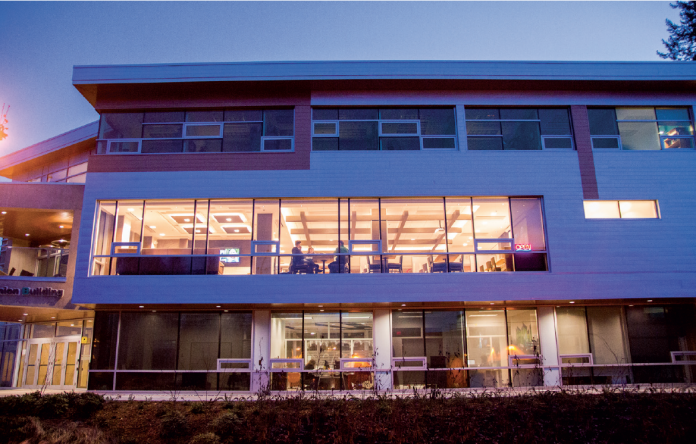In preparation for the upcoming 2022 Olympics in Beijing, UFV recently hosted a group of Chinese delegates who came to Canada to learn more about the success of the 2010 Olympics in Vancouver, as well as the history of winter sports. The 20 delegates arrived October 30 and stayed for 13 weeks. The delegates came to UFV with two goals in mind: to learn about long-term athlete development and how to host Olympic Winter Games.
The group consisted of a variety of professionals with experience in the sport industry. This included sports administrators, HR personnel, national coaches, team managers, and university faculty.
UFV International and the department of kinesiology collaborated to provide the delegates with lecture-style seminars as well as hands-on learning sessions relating to long-term athlete development. Seminars were delivered by members of the faculty of kinesiology on such topics as sports psychology, physical literacy, exercise science, and best practices in coaching and leadership theory. The delegates were especially interested in how Canada dealt with long-term athlete development.
Chris Bertram, associate professor of kinesiology, stated that the delegates were curious about how Canadian athletes develop.
“When we look at the Canadian long-term athlete program, we look at how we can develop kids into elite athletes, or even olympians,” said Bertram.
Unlike China, Canadian children are exposed to a variety of sports and athletic development is made to be fun and engaging. As children get older and more mature, that’s when the sport they have chosen becomes more intensive and more specialized. According to Bertram, the Chinese identify key strengths in children at a young age and herd them into a specific sport path. The child will then grow up in that chosen sport until they have developed into a high performance athlete.
The delegates also had the opportunity to tour various Vancouver Olympic venues such as the Richmond Oval, Roger’s Arena, the Sliding Centre, and Nordic Centres in Whistler.
The delegates wanted to see how the 2010 Games in Vancouver were conducted. By visiting some of the Olympic venues, the delegates were able to see firsthand how the venues are run and maintained. On these tours, they were also able to learn more about the operations of large venues.
As well as learning from various faculty members from UFV’s department of kinesiology, the delegates had the opportunity to meet with some of the representatives from the 2010 Olympic Games to learn from their experiences while being a part of the Games.
These representatives included coordinators for volunteers. The representatives shared their experiences and strategies for screening, selecting, and methods for managing all the volunteers. On-site managers also shared the successes and challenges they faced during the Games. They then offered advice for avoiding potential problems.
Other experts included the director of performance, the director of pacific sport, and the chief medical officer for the Vancouver 2010 Olympic Games.
The delegates also met with Jeff Pain, a former Canadian skeleton silver-medalist who is now the head coach of the Chinese skeleton team. Pain, who was a Canadian pioneer of skeleton, shared his experience of finding the sport, how it was initially organized, and how it operates now. As a Canadian-trained athlete now coaching in China, Pain was able to contrast his perspective on long-term athlete development, and offered insight as to how the Chinese system could be improved.
UFV was able to connect the Chinese representatives with members of the Vancouver organizing committee for the 2010 Olympic and Paralympic Winter Games (VANOC). Through these connections, the delegates were able to learn about things like planning a general timeline that spans across the entirety of the Games, to managing the general workforce that will be responsible for all aspects of running the event, and even learning about Vancouver’s medical / crisis response strategies that were put in place for the Games.
Kara Bertram, a contract training and study tour coordinator at UFV International, said the tour was made possible because the general administration of sport in China reached out to UFV.
“In addition to the in-classroom sessions, the group was able to see and hear first-hand from those on the ground at the Vancouver 2010 Olympics, our legacy programs, how sport venues operate and how sporting events operate,” she said.
Chris Bertram mentioned that during the visit, a Chinese consulate member from the embassy in Vancouver came to see the delegates, and were very excited to see what they were learning. The consulate member had seen a news story about the delegates coming to Canada while back home visiting family in China, and wanted to see it first-hand.
“It is a big deal that the Chinese government is sending out the delegates to help improve the infrastructure for athletes,” said Chris Bertram.
After the group left, Bertram said that their experience was positive. He was confident that this trip provided the delegates with the tools to better serve their athletes back home, as well as providing insight to the successes that attributed to the running of the 2010 Winter Olympic Games in Vancouver. With the 2022 Beijing Winter Olympics rapidly approaching, Bertram said that the Chinese delegates feel confident in what they learned during their time in Canada.


